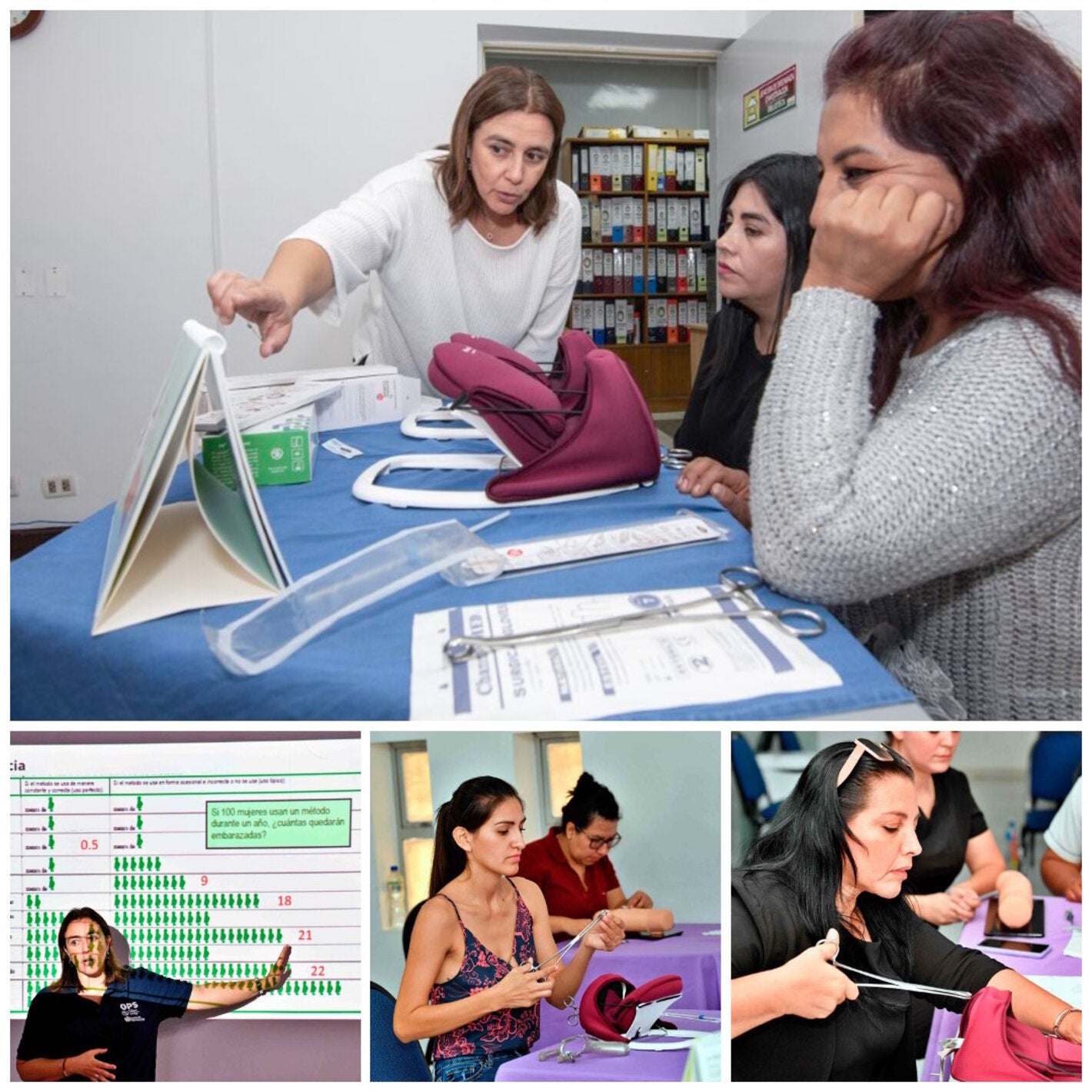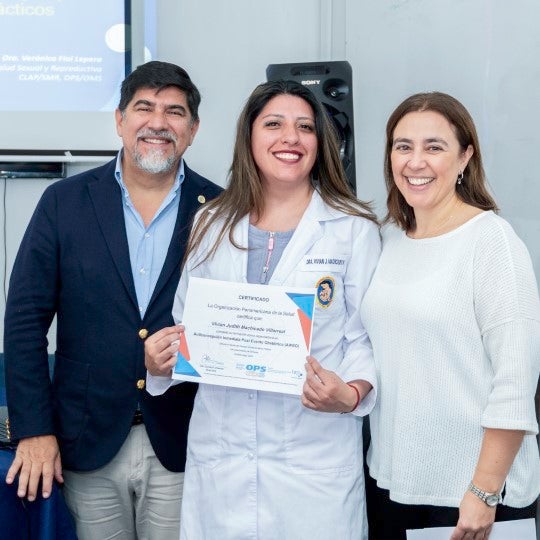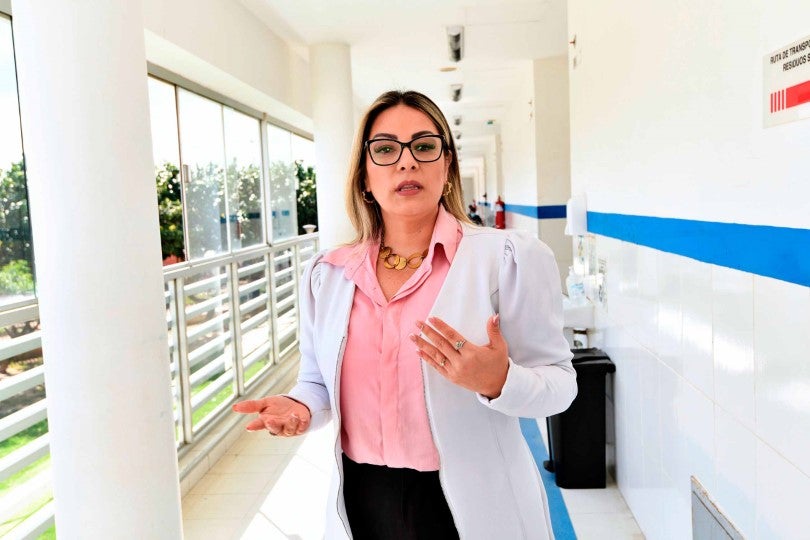
La Paz and Santa Cruz de la Sierra, Bolivia, May 13, 2024 (PAHO)- The country, through the Ministry of Health and Sports (MSyD), in coordination with the Pan American Health Organization/World Health Organization (PAHO/WHO) and an official mission of the Latin American Centre for Perinatology, Women and Reproductive Health (CLP/WR), conducted trainings for facilitators to promote the immediate post-obstetric contraception strategy (AIPEO for its acronym in Spanish) to expand and improve access to contraceptive methods after childbirth, caesareans or abortion. The AIPEO strategy is part of policies to reduce maternal morbidity and mortality.
A group of health professionals from referral hospitals in Santa Cruz, Beni, Oruro and La Paz were trained as facilitators of immediate post-obstetric event contraception. AIPEO is one of the planned strategies that emphasises the offer and placement of long-acting reversible contraceptivemethods (LARC) prior to discharge. The training of facilitators aims to slow down maternal deaths in Bolivia.
CLP/WR International Sexual and Reproductive Health Consultant and one of the facilitators of the AIPEO strategy, Veronica Fiol, said that ‘family planning allows people to choose how many children they want to have and how often. This is achieved through multiple interventions, such as comprehensive sexuality education and access to modern contraceptive methods.
Fiol pointed out that ‘the AIPEO strategy benefits all women but fundamentally the most vulnerable populations, such as adolescents, women over 35 and those with chronic pathologies in which a second pregnancy can increase the risk of disease.
LARCs include intrauterine devices (IUDs) and subdermal implants.
Through simulation devices donated by CLP/WR PAHO/WHO, health personnel received training in the insertion of IUDs and subdermal implants. As well, in Santa Cruz, in the 2nd level hospital of Villa 1 de Mayo there was the possibility to practice on patients who recently gave birth and who gave their informed consent.
The data
According to official figures from the National Health Information System - Epidemiological Surveillance (SNIS-VE) of the MSyD, until 2022, Bolivia registered a decrease in adolescent pregnancies in recent years. The figure for 2022 is 35,470 pregnant adolescents. In relation to fertility, it is estimated that, in 2023, women had an average of 2.5 children during their reproductive life. In the specific case of adolescent fertility, a 31 per cent reduction is observed, if one compares the rate of 90.3 live births per 1,000 women aged 15-19 in 2000 with the figure of 62.3 in 2023.
This reduction is attributed to several things. First, the launch of the Unified Health System (SUS) in 2019 increased adolescents' access to insurance and all services. On the other hand, the Ministry of Education began to reaffirm its prevention policies.
Bolivia works on the prevention and promotion of long-acting contraceptive methods in health centres and under long-standing legal regulations.
Another relevant fact is that 98.1% of births in Bolivia are attended by trained personnel.
The maternal mortality ratio for 2020 was estimated at 160.9 per 100,000 live births, a reduction of 43.3 per cent compared to the 2000 estimate.
One of the strategies that the PAHO/WHO Country Office is strengthening the capacities of health personnel in the AIPEO strategy, management of haemorrhage, sepsis and arterial hypertension, correct completion of the perinatal history, referral and counter-referral, among others.
This training of facilitators is part of the implementation of the project Improving the Health of Women and Adolescents in Vulnerable Situations in Bolivia, funded by Global Affairs Canada and executed by the Country Office of the Pan American Health Organization/World Health Organization (PAHO/WHO), in coordination with national and local authorities.
Testimonials from trainees
| Alejandra Vargas, General Practitioner. Women's Hospital - La Paz. ‘Contraception is very important both post-abortion and post-partum to preserve the safety of the woman and for the safety of the children or future children to be born. It helps to ensure that births are more spaced out and that there are no unwanted pregnancies that could lead to clandestine abortions or even the death of the woman’. | |
| Mabel Laura Cabrera, General Practitioner. Department of Teaching and Research, Hospital de la Mujer - La Paz. ‘It is very important to educate and inform all pregnant women about these post-obstetric contraceptive methods so that they can plan their pregnancies and avoid abortions. It is also important that we have the supplies to administer to any pregnant woman or person who arrives or requires or requests this implement’. | |
| Iris Jackelin Lijeron, deputy director. 2nd level hospital Villa 1ero de Mayo - Santa Cruz. ‘It is very important that all our staff is trained in the implementation of AIPEO so that the entire population and the community around the institution can learn about contraceptive methods and implement them. |







